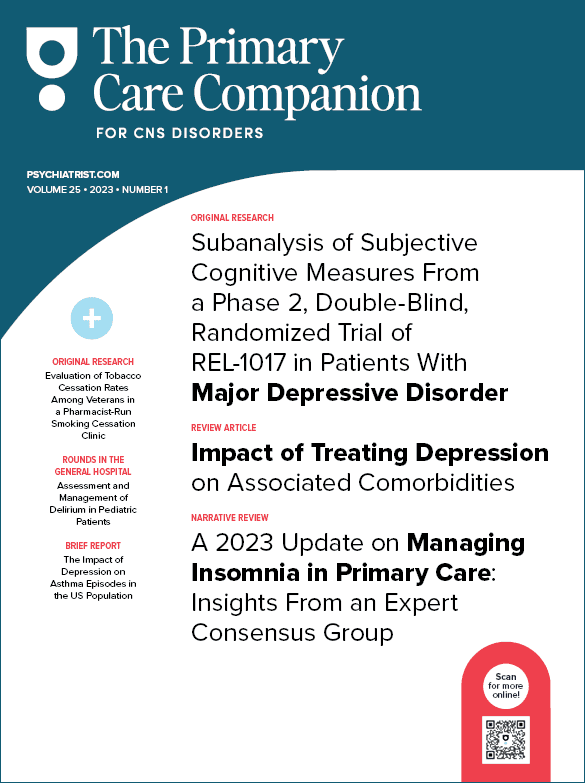Chronic Alcoholic Hallucinosis Masquerading as Schizophrenia: A Case Report
To the Editor: Alcoholic hallucinosis is a well-known phenomenon consisting of vivid auditory hallucinations that begin immediately following the reduction or cessation of alcohol consumption.1 The estimated prevalence of alcohol hallucinosis is 7.4% among alcohol-dependent inpatients,2 a subset of whom will develop chronic hallucinations that resemble paranoid schizophrenia.3 Here, we present a case of chronic alcohol hallucinosis previously diagnosed and treated as schizophrenia.
Case report. Mr A, a 32-year-old man, was admitted recently to the inpatient psychiatry ward after several visits to the outpatient psychiatry service.
Mr A complained of auditory pseudohallucinations that began in adolescence. These were described as 3 adult male voices with origin inside the head that are ego-dystonic and frequently attempt to persuade him to hurt himself. His hallucinatory experiences were identified during an inpatient stay for alcohol rehabilitation about 5 years earlier at another center. At the time of discharge, he was given the diagnosis of schizophrenia (DSM-IV-TR criteria) and was started on clozapine treatment. Mr A began drinking alcohol to excess at the age of 14 years, with self-report ranging from 7 to 48 standard drinks per day. Mr A smokes tobacco daily and cannabis occasionally and has been a heavy user of several other substances. Previously known treated diseases were unremarkable and stable. Mr A’s family history is significant for psychiatric illness, including mood disorders, substance use disorders, and suicide. There was no evidence of thought disorder.
Results of physical examination and broad laboratory screens were unremarkable. Findings of noncontrast magnetic resonance imaging were similarly unremarkable. Outcomes of neuropsychological testing were remarkable for poor verbal memory, both immediate and delayed. A previous psychological report was obtained and noted third- to fifth-grade capabilities in reading, spelling, mathematics, and verbal comprehension as well as strong visuospatial ability.
Clozapine therapy was ceased by slow taper. Mr A was monitored closely but was unable to notice any subjective changes. The nursing and medical staff were similarly unable to note any objective changes. Mr A was discharged 16 days following the cessation of clozapine therapy. He will be assessed for a therapeutic trial of a newer neuroleptic agent such as risperidone or lurasidone and anticraving medications such as acamprosate.
Here, we present a unique case of what we believe to be persistent alcoholic hallucinosis occurring for many years. Our patient was initially diagnosed with schizophrenia; however, upon further inspection, we do not believe this to be the case. He has insight into his illness and has no evidence of thought disorder or negative symptoms, and his illness has not run the typical course of schizophrenia. Furthermore, he lacks the characteristic memory loss and confabulation typical of Korsakoff’s psychosis. Misdiagnosis resulted in exposing the patient to the risks of superfluous pharmacotherapy, in this case, metabolic syndrome, cardiac arrhythmias, and blood dyscrasia. We suggest that alcoholic hallucinosis should be suspected in patients who present with auditory hallucinations and significant alcohol use history and who are refractory to best-practice pharmacotherapy for schizophrenia.
References
1. de Millas W, Haasen C. Treatment of alcohol hallucinosis with risperidone. Am J Addict. 2007;16(3):249-250. PubMed doi:10.1080/10550490701375269
2. Tsuang JW, Irwin MR, Smith TL, et al. Characteristics of men with alcoholic hallucinosis. Addiction. 1994;89(1):73-78. PubMed doi:10.1111/j.1360-0443.1994.tb00851.x
3. Glass IB. Alcoholic hallucinosis: a psychiatric enigma—2: follow-up studies. Br J Addict. 1989;84(2):151-164. PubMed doi:10.1111/j.1360-0443.1989.tb00564.x
Author affiliations: Schulich School of Medicine and Dentistry, The University of Western Ontario, London, Canada (Mr Taylor and Dr Chandrasena); and Chatham-Kent Health Alliance and Public General Hospital, Chatham, Ontario, Canada (Dr Chandrasena).
Potential conflicts of interest: None reported.
Funding/support: None reported.
Published online: August 1, 2013.
Prim Care Companion CNS Disord 2013;15(4):doi:10.4088/PCC.13l01523
© Copyright 2013 Physicians Postgraduate Press, Inc.




